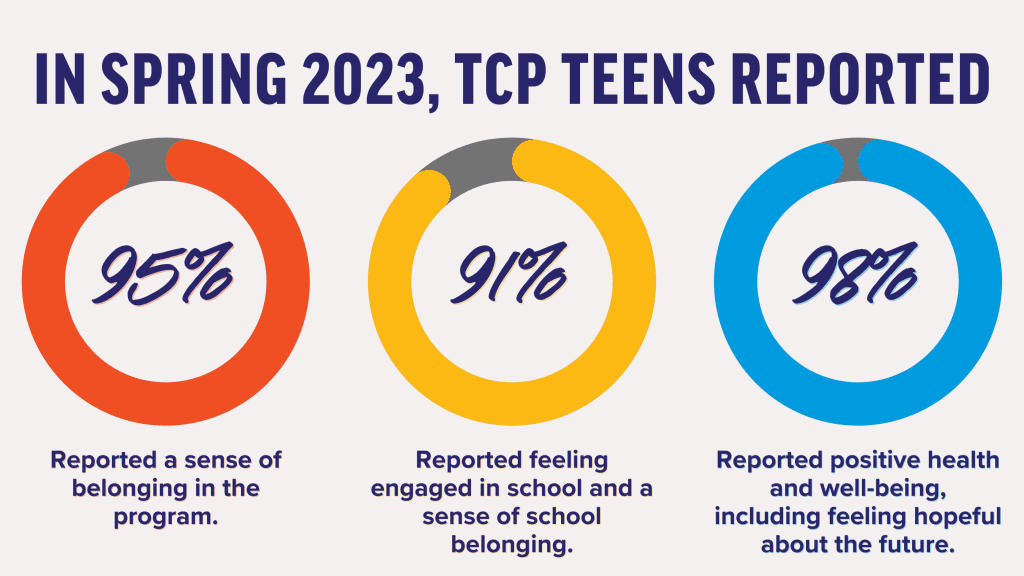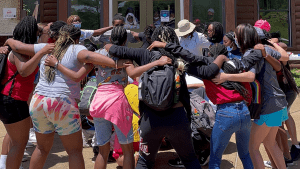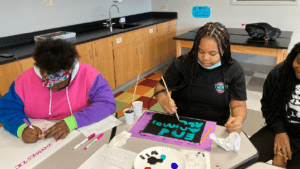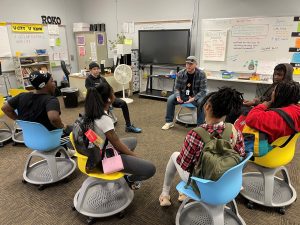By Crystal Smith, Director of the Teen Connection Project (Wyman) and Dr. Joseph Allen, Hugh P. Kelly Professor of Psychology (University of Virginia)
Teens are experiencing higher levels of anxiety and depression than ever before and are lonelier than any other age group in America. Although the pandemic played a large role in these feelings of isolation and loneliness, evidence suggests it began even earlier. According to Newsweek, in 2019 more than 1 in 3 teens “reported feeling so sad or hopeless at some point over the past year that they skipped regular activities, a 44 percent rise since 2009.”
It remains unclear why these rates are increasing, but we do know that the pandemic amplified these feelings. Young people are struggling more than ever with loneliness and mental health issues.
The U.S. Surgeon General, the Centers for Disease Control and Prevention, and other experts in the field all agree – we need to offer more opportunities for young people to connect with their peers, their schools, and their communities. Improving social connections for young people has been shown to improve mental health, increase academic engagement, and even positively impact long-term physical health.
We have always recognized the importance of connections. Several years ago, we identified the need for more support for teens in this area and partnered to develop the Teen Connection Project (TCP). The inspiration for TCP came from experience as well as conversations with young people. We have seen that when youth are part of supportive peer groups, their overall high school experience is more positive. Interest grew from there to identify what makes up supportive peer groups, and how we could intentionally create these groups.
What is the Teen Connection Project (TCP)?
Imagine if all young people felt empowered to express their feelings to peers, and then experienced those peers taking action to support them.
The Teen Connection Project (TCP) – which we developed in 2014 – is a 12-14 week program that contains 12 lessons for high school aged youth. Lessons start with opportunities for the group to get to know each other, establish expectations for their time together, and gain a deeper understanding of the importance of connections.
They continue through lessons that address barriers to connecting – such as how we communicate and handle conflict, and our views on trust. Week by week, participants have opportunities to share their personal experiences.
One example is the lesson ‘If You Really Knew Me’. Teens anonymously respond to prompts regarding a variety of topics, including things they worry about or what they find difficult in school. This provides a safe space to be vulnerable and connect with their peers.
As teens move toward their final lesson, they share a challenge with each other. Something that has influenced who they are. This helps them see everyone has a story and sometimes knowing those stories allows us to connect on a deeper level. They wrap up the program with a celebration of each other. Everyone is celebrated for their strengths; they reflect on their time spent together, and how they can carry their experiences into other areas of their lives.
In TCP, young people are presented with a supportive environment, caring adults, the opportunity to take healthy risks, and a safe environment to open up and connect with each other. And they are leaning into that opportunity with enthusiasm.
How does TCP impact other areas of teens’ lives?
Research shows that TCP participants complete the program with an increase in the quality of their peer relationships, higher levels of using social support to cope, increased school engagement, and lower levels of depressive symptoms.
Additionally, they are taking these experiences and lessons into other areas of their lives. Teens share that they are more willing to speak to someone they don’t know and are feeling more confident in their social interactions. Teachers say students who previously were reserved and disengaged in class are speaking up and participating more. School staff see students making new friends. “TCP taught me that it’s okay to continue opening up with my friends and being assertive about my feelings,” says L.G., a TCP participant. “I am me and there is nothing wrong with that.”
Participants in the program frequently express that they believe all high schoolers – and even adults – could benefit from participating in this program. “I would recommend people to TCP because it’s an opportunity to meet new people, it’s a great safe place to talk about stuff, it’s an open space, and it makes you feel better,” says Gibraun Crawford, TCP participant at University City High School. “In TCP Lesson 7, You Are Not Alone, it’s like a deep talk with everyone and you can get feelings off your chest. Everyone has problems, not everybody is perfect. I feel like people should know everybody goes through things and that they are not alone. When we talk to others about problems, it can be a relief and it can make you feel better.”
As a facilitator, Crystal has seen young people go from barely knowing the names of their fellow group members to sitting together at lunch and walking together. Other facilitators have seen participants share with peers that they feel isolated and lonely at school, and watched those peers respond with solutions like volunteering to walk them to class, engaging with them on social media, and inviting them to hang out after school. “TCP encouraged the teens to be true to their emotions, gave them tools and strategies to make connections, and made them feel less isolated,” says R. Levario, a TCP Facilitator. “TCP offered many of these teens a safe space to express themselves.”
TCP’s reach and the importance of engaging more teens
In the 2023-2024 program year, more than 300 teens in the St. Louis region and nationally participated in TCP and that number continues to grow. We are committed to making sure it reaches as many teens as possible. Young people say participating in this program improves their sense of belonging and betters their social experience – especially in school. We know TCP can help combat the ‘epidemic of loneliness, isolation, and social disconnection’ because we see the positive impacts every day.
Call to Action
We know that TCP is one way we can promote health and healing among today’s teens and support healthy and authentic connections. We invite you to partner with us to help more teens build and sustain social connections.
- Share this with your network and advocate for the teens in your life. You can make sure that social connections and healthy relationships remain a priority by directly supporting the young people you care about, ensuring that the right resources are available to them, and advocating for them with policy makers.
- Become our partner and bring the Teen Connection Project to teens in your community. If you are interested in learning more about replicating TCP, you can visit TCP | Wyman Center
- Become a donor to support our programs and our research. Wyman is a non-profit learning organization that creates, delivers, and distributes proven programs to young people. We are always innovating, adjusting, and improving to ensure we meet the needs of the young people we serve. The support we receive from our community helps us continue this work and deliver quality programming. If you are interested in becoming a donor, visit Donate | Wyman Center
Additional Resources
Seven Strategies Philanthropists Can Use to Help Tackle America’s Mental Health Crisis | Bridgespan
Why Americans Suddenly Stopped Hanging Out – The Atlantic










